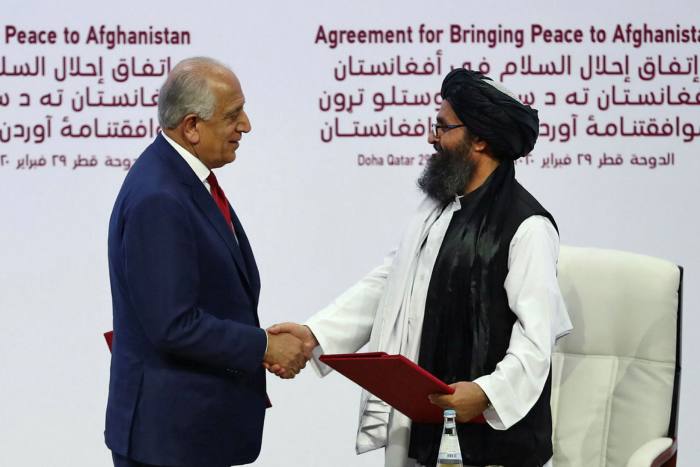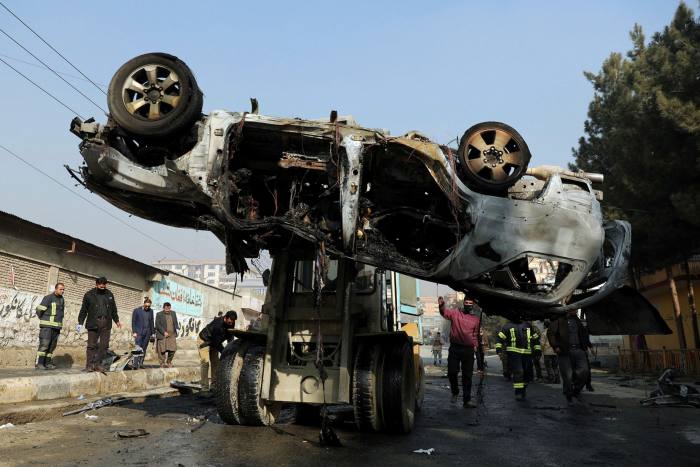Gul Muhammad joined the Afghan army in 2016 when he was just 22. He wanted to serve his nation by fighting the Taliban and make an honest living as a soldier.
But after the US signed a peace deal with the Taliban last year, Muhammad felt increasingly desperate as the army lost territory and suffered heavy casualties.
In December, Muhammad surrendered to the Taliban, one of four soldiers in his company that deserted around the same time. “Our commander was careless about soldiers’ lives, they were stealing our food and salaries and deploying us without planning,” he said. “This war has no morality, the Taliban are stronger and they are brutal.”
Muhammad’s hopelessness is endemic across Afghanistan after US president Joe Biden announced plans to “end the forever war” and withdraw all US and Nato troops from Afghanistan by September 11, the 20th anniversary of the 9/11 attacks.
“War in Afghanistan was never meant to be a multigenerational undertaking,” Biden said in an address on Wednesday.
The US leaves Afghanistan at a time when the Kabul government is fragile, beset by corruption and poisonous internal rivalries. Some in the Taliban say they are confident that if they bide their time they can install an Islamic Emirate, a scenario that risks completely reversing US efforts support the democratisation and modernisation of Afghan society.
“Our jihad will continue until we have established and restored an Islamic regime,” a Taliban leader and ex-governor in eastern Afghanistan told the Financial Times. “Our guns and bombers are ready to strike on remaining forces in Afghanistan and the puppet regime.”
As the US steps back, Afghanistan’s neighbours — Pakistan, Iran, Russia and China — are waiting to step into the power vacuum, evoking the great power rivalries in the region of the late 19th century between Britain and Russia.
Sajjan Gohel, a south Asia expert at the London School of Economics, said there were disturbing parallels between the current US pullout and the Soviet withdrawal 30 years ago.
After the collapse of the Soviet regime, Afghanistan became a haven for Islamic militants around the world. “The house of cards came down,” said Gohel. “Ungoverned spaces are the greatest asset for extremism to flourish.”

Biden set the withdrawal date after taking over a deal brokered by the Trump administration and which he said was “perhaps not what I would have negotiated myself”. The Doha deal, signed between the US and the Taliban in February 2020, set a timetable for withdrawal. In exchange, the Taliban gave assurances it would not allow al-Qaeda to threaten the US from Afghanistan, and would reduce levels of violence, a pledge politicians say it has failed to deliver on.
The Taliban secured the release of thousands of prisoners while launching a relentless assault on Afghan security forces and civilians. More than 500 civilians have been killed in Afghanistan in the first three months of 2021, a 30 per cent rise from the previous year, according to the UN. The Taliban has been blamed for a wave of assassinations of journalists, judges and activists that have rattled civil society.
Talks between the government of Afghan president Ashraf Ghani in Kabul and the Taliban to reach a power-sharing deal have ground to a halt, prompting the Biden administration to suggest a new multinational peace conference in Istanbul to chart a way forward. The Taliban have refused to attend.
Christopher Kolenda, a retired army colonel who has negotiated with the Taliban, said the US had little leverage after a series of “missed opportunities” to exit.
He warned that in the absence of a comprehensive regional approach to peace “Afghanistan’s neighbours continue stirring the pot with their proxies and transferring security problems”.

Chris Alexander, a former Canadian diplomat, has been outspoken about the US and its allies not holding Pakistan accountable for its role in supporting the Taliban by offering funding and sanctuary for its leaders.
“The US and Nato allies have not yet even tried the best strategy available for ending this war: sanctions against those responsible for it in Pakistan. With or without international military forces on the ground, united political action is required to end Pakistan’s proxy war,” he said on Twitter.
Afghans are bracing for a future without the US to keep the Taliban at bay. Many, like Ghousuddin Frotan, are trying to flee to Europe or neighbouring countries.
“Due to the worsening security situation and the target killings, I want to leave the country,” said Frotan, a director at a social development organisation, “I know many other people who want to leave.”
Madiha Afzal, at the Brookings Institution, said the rights of women had been put in jeopardy. “The Taliban leadership have learned how to evade some of these questions of rights to gain international legitimacy, but the group’s ideology remains the same,” she said.
A senior US administration official said Washington would support women’s rights through diplomatic means and would still have significant counter-terrorism assets in the region to counter a terrorist threat in Afghanistan, and to hold the Taliban to its commitment to ensure al-Qaeda does not once again threaten the US.
But the Taliban are “emboldened” by the diplomatic legitimacy the US deal has given them, said Naheed Farid, a member of Afghanistan’s parliament. “They didn’t disconnect their ties with al-Qaeda. If the mission was to counter international terrorism the mission has not been accomplished.”
A former US military commander also cast doubt over the feasibility of the Biden administration’s commitment to provide assistance to the 300,000-strong Afghan national security forces that the US had spent years training and equipping.
“It is to be anticipated that those extremist groups [the US took military actions against] will establish new sanctuaries in areas not controlled by the Afghan government in the future,” they said.
Muhammad, the former soldier, fears the Afghan military may not be strong enough. “Without US and foreign troops, Afghans will be killed like chickens in a butcher shop.”

